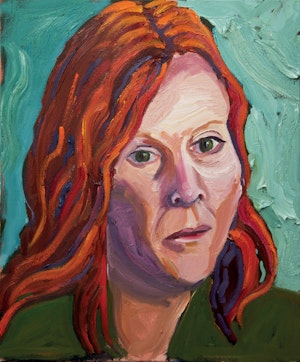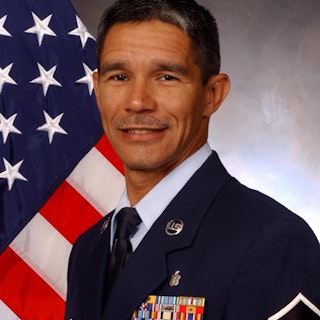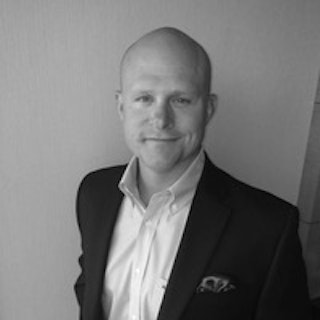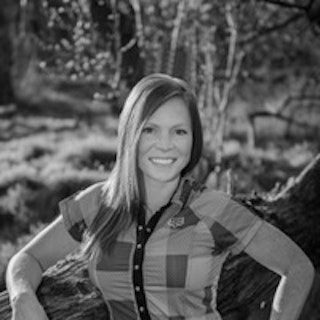Roads to Recovery
Military training includes rigorous physical fitness, mental strength, and tactical knowledge. But how well do we prepare our warriors to come home? We spoke with three who open up about their road to recovery back home.
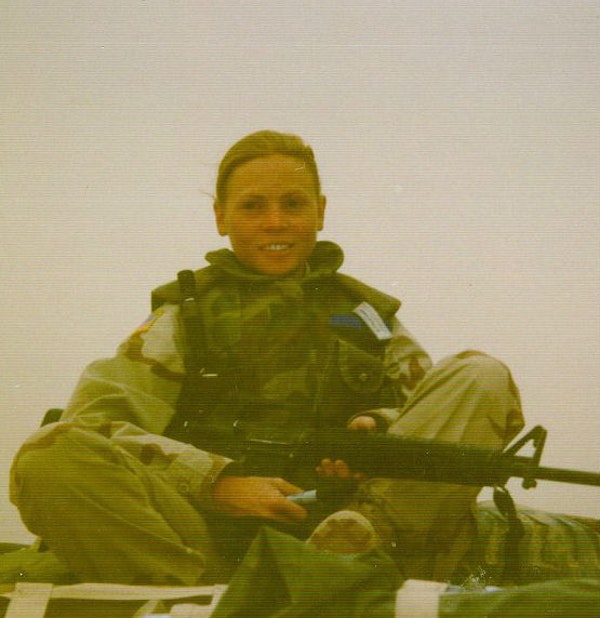 Sergeant Leslie Zimmerman in Iraq in 2003. (Photo courtesy Leslie Zimmerman)
Sergeant Leslie Zimmerman in Iraq in 2003. (Photo courtesy Leslie Zimmerman)
The Catalyst, led by Editorial Assistant Sabrina Shaikh, conducted an electronic roundtable with three warriors President George W. Bush painted for Portraits of Courage, his recent book and accompanying special exhibit at the Bush Center in Dallas. We asked how they identified their post-traumatic stress, sought help, and worked with others through a difficult process.
We also asked them to assess where they are now on their road to recovery. We offer this interview as a way to help other post-9/11 veterans deal with post-traumatic stress, traumatic brain injury, and other invisible wounds of war.
How were you able to detect your symptoms? Was there one “wake-up call” or a series of events that made you realize you needed to seek care?
Zimmerman: I had all of the symptoms of post-traumatic stress, but I did not associate it with PTS. I just thought maybe I was having a rough day, but the rough days didn’t end. They became more intense.
I attributed the symptoms to other things in my life, such as schooling, military promotion, and increased responsibilities. I didn’t realize that something that happened in the past could still have lasting effects on me, causing depression, thoughts of suicide, anxiety, anger, sleep issues, relationship problems, and nightmares.
I thought if I went full-force into my work, school, and mountain-bike racing that I could just get over it and “fix myself.”
I didn’t have a single wakeup call, more of a series of events that led me to seek treatment. One was when I was a sergeant in the Army and simultaneously training to be an emergency medical technician. For this, I had to do ambulance ride-a-longs, and emergency room shifts. My symptoms got worse every time I would treat someone who likely would die or have a permanent life-altering injury.
I would go into a “don’t think about it, just get the job done” mode, like I had in Iraq when treating injured soldiers. Each time, it would be harder to snap out of it, and I would be numb and disconnected for days, angry, irritable, and depressed, often times suicidal because I didn’t see an end to how I felt.
My final wakeup call was going through a divorce. I had pushed everyone away in my life because I was ashamed of how I felt and I couldn’t just suck it up and drive on. I also didn’t want to ask for help because I didn’t know what was wrong, or even who I would go to for help.
I also didn’t want to ask for help because I didn’t know what was wrong, or even who I would go to for help.
-Leslie Zimmerman
I am a strong person, and I take pride in being able to handle any situation, but all at once I felt no control over this. I couldn’t even live my life on a day-to-day basis. Simple things were hard for me to accomplish. I had less and less ability to pick myself up or pretend I was okay.
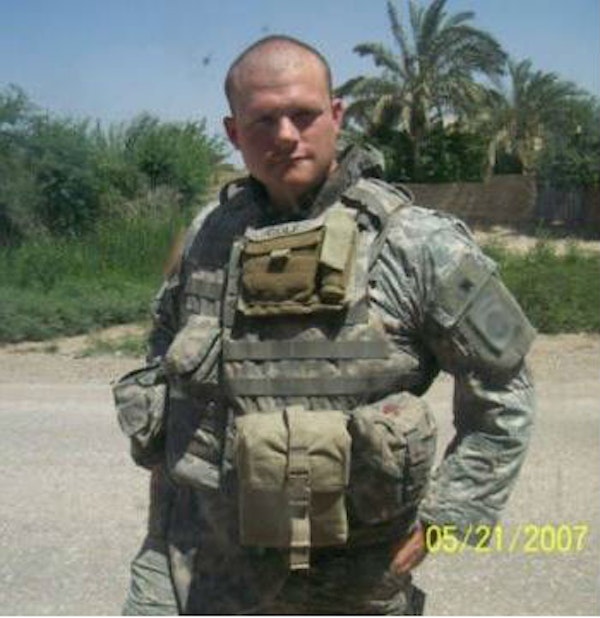 Sergeant Bryce Cole in Iraq, May 21, 2007. (Photo courtesy Bryce Cole)
Sergeant Bryce Cole in Iraq, May 21, 2007. (Photo courtesy Bryce Cole)
Cole: I was fortunate enough to have my wife and family point out my changes in behavior. It was obvious once they pointed it out but not so obvious to me.
My hyper-aggressive and often-destructive behavior that stemmed from my PTS caused massive rifts in my marriage. At the risk of losing my family, I sought treatment.
I was fortunate enough to have my wife and family point out my changes in behavior. It was obvious once they pointed it out but not so obvious to me.
– Bryce Cole
Urena: Shortly after returning from Iraq in 2005 and returning to work at the U.S. Air Force’s 97th Medical Group, I was assigned to the medical readiness section of my group. That was after working three years as the non-commissioned officer in charge of a flight medicine clinic.
Then, she recommended I do a 12-week counseling program for PTS. Accepting and facing this was difficult. How do I let friends, family members, and others know that I have mental issues?
We had 90-minute weekly Skype sessions. At the beginning, I welcomed it. But midway, it was hard to bring out the vivid stories and accounts of things that went on daily. I had to recall the horror and chaos of moments in the emergency room, where the wounded didn’t stop coming.
The counselor assured me it would get better, but I didn’t want to continue. It was hard enough to talk about all this, and then go through different exercises where I had to write down my experiences. It was hard to re-listen to the accounts in my own words.
I got used to it, though. My challenge now is still dealing with dreams, nightmares, and sudden noises. The images are still present. The difference is I can resort to tools and exercises.
My challenge now is still dealing with dreams, nightmares, and sudden noises. The images are still present. The difference is I can resort to tools and exercises.
-Roque Urena
 Master Sergeant Roque Urena (left) with his fellow medics in Balad, Iraq in 2003. (Photo courtesy Roque Urena)
Master Sergeant Roque Urena (left) with his fellow medics in Balad, Iraq in 2003. (Photo courtesy Roque Urena)
This was a good fit for me. I had a good understanding of essential requirements for peacetime and wartime deployments. Knowing just about everyone’s medical readiness needs in the small group was essential. It was a very tight family.
Things were not the same for me after I returned. Of course, I never mentioned this to anyone. Back then, we didn’t have the same help we have now. I remember filming a message to my family before I deployed, just in case I never made it back.
I knew all the providers in the mental health clinic. One day I was brave enough to ask one of them in the hallway if we could chat for a few minutes. I still had the fear of being reported and having mental problems would affect what was left of my military career.
I expressed to him my feelings, nightmares, the constant images in my head, and my reaction to things that brought back vivid memories of my experiences. He gave me some exercises to do, such as write things down.
This was all off-the-record, of course. The hardest part was the uncontrollable emotions. The hypersensitive way I reacted to noise, for example, could be embarrassing. I can only attribute this to all the suffering, treating so many wounds, and witnessing so many dead bodies. And there were the mortar attacks and the sound of gunfire.
Believe me, you never forget the images.
The hardest part was the uncontrollable emotions. The hypersensitive way I reacted to noise, for example, could be embarrassing. I can only attribute this to all the suffering, treating so many wounds, and witnessing so many dead bodies. And there were the mortar attacks and the sound of gunfire. Believe me, you never forget the images.
-Roque Urena
After you decided you wanted help, what challenges did you face? What steps did you take?
Urena: After I retired in 2008, I enrolled at a Veterans Affairs medical facility and did my physical. The doctor asked me how I was doing. I mentioned some things related to my mental wellness. I guess he noticed something. He wanted to refer me to a psychologist for a session. That turned into about four sessions.
Zimmerman: The biggest challenge was finding care. I had a difficult time using the VA. Appointments were scheduled three-to-four months out just to be seen for the first time. Once I did get an appointment, there was no follow-up, unless I called and insisted upon it.
I was still unsure about whether I really needed help, so this was just another reason for me to not push for being seen. When I moved from California to Utah, things were a little better as far as being seen. But the continuity of care was still lacking. My primary care provider, psychiatrist, and counselor were all on separate pages. They didn’t consult with each other. I was given every medication under the sun, or so it seemed. None of them made me feel the way I did before I deployed. I still felt out of control and not like myself.
It took – and it still takes – me being my own advocate in getting the care I need. Seeking treatment, and staying in a healthy place, took finding the right people that fit with me. There isn’t one right counselor, therapy, or medication that works for everyone. It takes trial and error, and being able to start again if what you tried didn’t work.
It took – and it still takes – me being my own advocate in getting the care I need. Seeking treatment, and staying in a healthy place, took finding the right people that fit with me. There isn’t one right counselor, therapy, or medication that works for everyone. It takes trial and error, and being able to start again if what you tried didn’t work.
-Leslie Zimmerman
It took a VA counselor, Larry Dewey, investing in me to make me realize that I should invest in myself again. He is a Harvard grad who specializes in PTS. He works for the VA because he loves veterans, even though he could do financially well in any other job. He wrote a book, War and Redemption: Treatment and Recovery in Combat-Related Posttraumatic Stress Disorder. I am lucky to have had him as a provider. He created the path for healing.
Cole: The challenges I faced were the same with any therapy. You have to do what they tell you and implement their recommendations in your life.
I sought therapy through my church recovery group and, of course, through mountain biking.
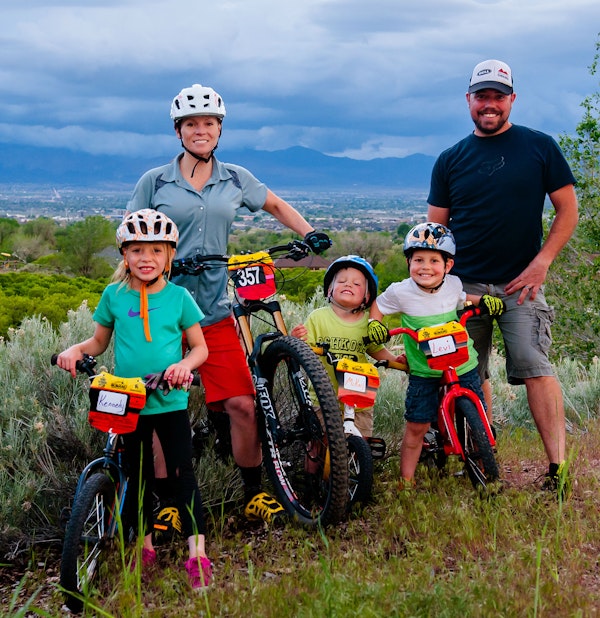 Sergeant Leslie Zimmerman with family, May 15, 2015. (Photo courtesy Leslie Zimmerman)
Sergeant Leslie Zimmerman with family, May 15, 2015. (Photo courtesy Leslie Zimmerman)
You have all mentioned how your family and supportive groups helped you identify your need for help. What role did they play in the process? How instrumental was their support?
Zimmerman: My family had a huge impact, but most of all was the support of my husband Judd. For the first time, I didn’t feel like I was being judged when I told him how I felt and what I was going through. He didn’t make me feel like I should just deal with it, or that it was all in my head.
I finally could fully commit to seeking help, and letting down my walls that had protected me from judgment and held me in a state of confinement. He didn’t think I was crazy when I would wake up in a panic from nightmares. Or when I didn’t want to leave the house, or couldn’t pick myself up off the floor. He only held me and said he was there for me.
That is the most important thing for anyone suffering from any type of mental or physical illness. They need to know that someone who loves them is there no matter the outcome. They need to know someone supports them through the ups-and-downs.
As far as my family/significant others identifying issues and symptoms, they could see the differences in me. They knew I was struggling. But I feel like they didn’t know what was happening, or even what to do about it.
That was similar to how I felt when I first started having symptoms after returning from Iraq. I just didn’t know then, or maybe I was afraid to see it. Maybe they were afraid to acknowledge the problem. Then, they would be in the position of knowing, and still not be able to help.
Urena: My wife said she noticed I had changed. It was like a mutual understanding. She didn’t want to hear the stories and I didn’t want to talk about them. But she was always supporting me and not blaming me for anything. We talked about marriage counseling, but that never happened.
Things got a little better when I sought counseling and she knew I was seeking help. I also have two military/vet friends that I can talk to and we always keep in touch. In 2013, when I went to President Bush’s Warrior 100K bike ride, it was an awesome experience. I got to meet the commander-in- chief during the time I deployed. There was the bike ride, and the opportunity to be with and meet so many veterans that were going through the same things. I realized some were even worse off.
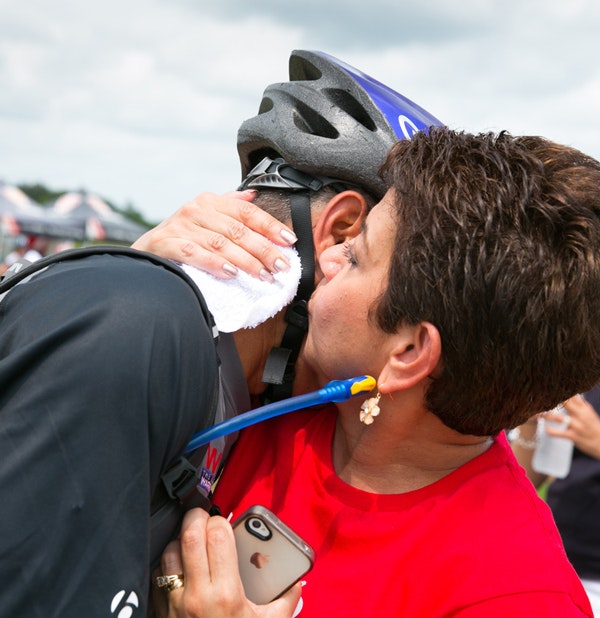 Marlene Urena greets her husband after day two of the 2013 W100K. (Paul Morse/George W. Bush Presidential Center)
Marlene Urena greets her husband after day two of the 2013 W100K. (Paul Morse/George W. Bush Presidential Center)
This opportunity opened the door to a network of vets and to be part of such other programs and organizations as the Wounded Warrior Project, the Independence Fund, and the Disabled American Veterans, to name just a few. This allowed me to do other activities with fellow vets and let me know that I wasn’t alone. It was easier to accept what I was going through.
The process is never ending. I don’t know about others, but my wife recently woke me up as I was having a terrible nightmare. I was screaming at the top of my lungs. I briefly remember being surrounded by dead bodies and asking for help to get out of there. It just happens, but it helps knowing each veteran’s story connects and relates to another.
Zimmerman: The bike ride was also a big help, like Roque mentioned. Attending the 2015 W100k was a really positive thing. To see the other 16 warriors thriving in life, and knowing that they went through similar and worse situations, I knew I was not alone in this daily fight. I have these men and women to rely on.
Cole: They were the backbone of my therapy and recovery by supporting and encouraging me.
Could you all expand more on where are you now in your recovery?
Cole: I feel like I’m in a great place in my life but this requires a constant commitment to my mental and physical therapy. It’s easy to slide back. I definitely have moments that are very hard to handle. But, overall, I’m in a great place.
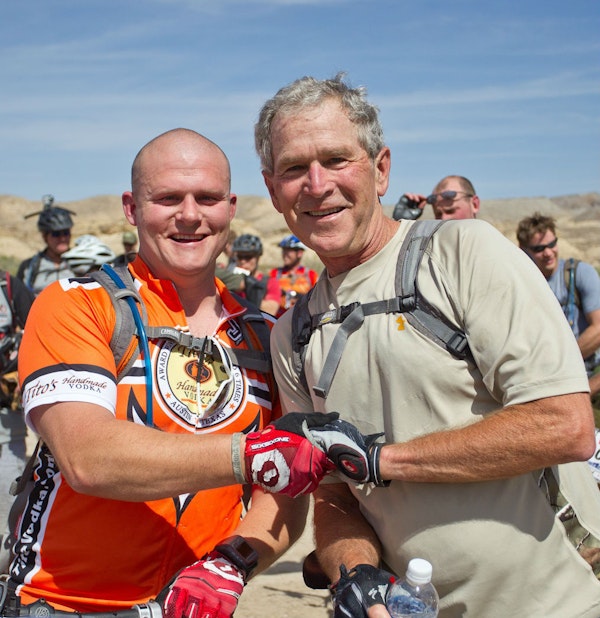 Sergeant Bryce Cole with President Bush after the 2012 W100K.
Sergeant Bryce Cole with President Bush after the 2012 W100K.
I thank God, my family, and all those who’ve helped in my journey.
I feel like I’m in a great place in my life but this requires a constant commitment to my mental and physical therapy.
-Bryce Cole
Zimmerman: I still have days where I am very depressed, and it seems like I am watching my little world pass me by. But days like those are very infrequent. And they are much more manageable than I used to feel before I invested in finding healing.
The hard times occur now when I am not taking care of myself, and not making a conscious effort to keep moving forward. It still rocks me to see accidents, injuries. I was up at a family reunion recently, when my dad’s best friend had a heart attack next door. I did CPR on him until Life Flight could arrive. I knew that he wouldn’t live when I saw him, but it didn’t make it easier. I struggled for the next few weeks with depression and severe anxiety.
What helps me is moving forward, consciously making the effort to accept what happened. Mountain biking has been the biggest outlet for my healing. When I am mountain biking I don’t think about anything other than the trail in front of me. I’m always thankful to be alive when I am in nature and riding bikes. It makes me question why I would ever want to give up on life.
My family is everything to me, and spending time camping, fishing, just being together gives my life more peace and happiness than I had ever thought I could experience or deserve. Also, knowing that my kids look to me as an example, as a teacher, makes staying committed to my recovery more of a priority. Most days are good, and that is better than I thought it could be.
Everyone has their struggles, and when I’m struggling, I hate to be told what to do. But I would tell those who are struggling some things that have helped me:
Don’t limit yourself to staying in a negative state, move out of it by finding one thing that you love (or used to love), and do it. Do it even if you don’t want to. Find someone who you can share how you are feeling. Sometimes it helps just knowing that someone else knows that you are struggling. Reach out for help, and if you don’t find it at first, reach out again until you find it. DON’T GIVE UP.
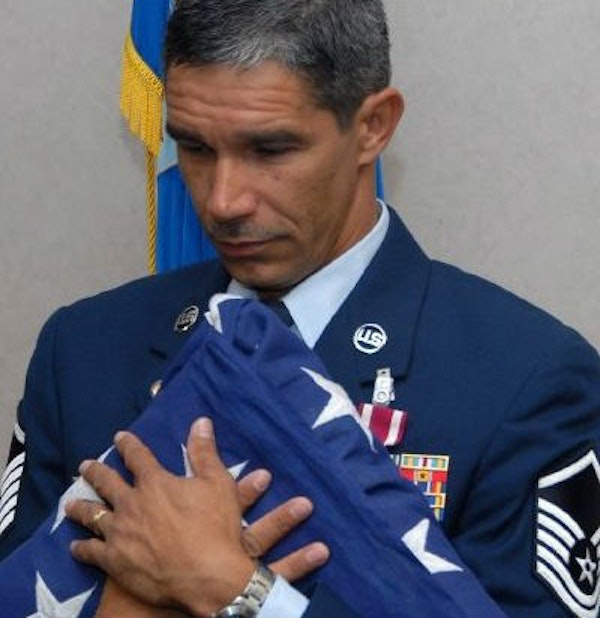 Master Sergeant Roque Urena at his retirement ceremony July 27, 2008. (Photo courtesy Roque Urena)
Master Sergeant Roque Urena at his retirement ceremony July 27, 2008. (Photo courtesy Roque Urena)
Urena: Leslie, you are reading my mind. Doing this now is therapy for me. It helps to talk about this.
It was hard to work in a civilian medical center after serving six years in an emergency department of a military medical facility. It brought back so many memories. But it was where I felt comfortable and enjoyed the work. Many times after caring for a trauma victim, I will find my own lonely place to calm down, relax, and compose myself.
Staying busy is the key for me, along with biking, tennis, running, and volleyball. They keep my mind occupied and keep me going forward. I am still in touch with my VA counselor and follow up with her.
The help is there. We all have to take advantage of that. No matter what will work for you, you need to do that. I try to always be positive and enjoy life one day at a time!
The Catalyst believes that ideas matter. We aim to stimulate debate on the most important issues of the day, featuring a range of arguments that are constructive, high-minded, and share our core values of freedom, opportunity, accountability, and compassion. To that end, we seek out ideas that may challenge us, and the authors’ views presented here are their own; The Catalyst does not endorse any particular policy, politician, or party.
-
Previous Article A Pipeline of Leaders An Essay by Colonel Miguel Howe, USA (Ret.), Director, Military Service Initiative, George W. Bush Institute
-
Next Article Encouraging Warriors to Take the Next Step An Essay by Colonel Matthew Amidon, U.S. Marine Corps Reserves, Deputy Director, Military Service Initiative, George W. Bush Institute

